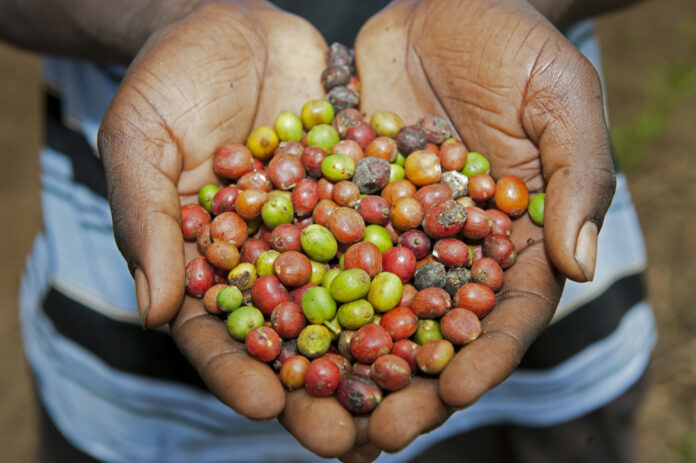As global coffee markets tense up, prices are surging, driven by fears of decreased output from Brazil and Vietnam, which are major producers in the coffee industry.
Amid a brewing storm of supply challenges, the price of coffee has spiked to new heights as concerns over a dry season in Vietnam threatening Robusta yields, combined with erratic weather in Brazil affecting Arabica crops, have prompted a sharp rise in coffee futures.
As the U.S., a major coffee importer, braces for impact, the ripple effects of the supply fluctuations could affect everything from the cost of a morning brew to the financial markets. The surge in prices comes at a time when global inventories are low, and speculative trading is on the rise, further fueling market volatility, according to a Vietnam Coffee Cocoa Association (VCCO) report issued Tuesday.
Farm Images/Universal Images Group via Getty Images
Futures prices for Robusta coffee—the bean used primarily in instant coffee and espresso—reached an all-time high this week due to an ongoing supply shortage in Vietnam, the VCCO said. May’s delivery prices reached highs of $3,849 per ton, with July contracts at $3,769 per ton.
“Despite high export figures, Vietnam predicts a 20 percent drop in output in the current crop year, which will likely affect exports in the remaining months of this crop year,” VCCO said in the report. “Combined with the fact that the market is ‘waiting for rain’ in Vietnam’s coffee region, the supply situation will probably remain tense.”
In Brazil, where Arabica—the bean used primarily for house blends and specialty coffee—is predominant, prices have also been under pressure.
Arabica coffee futures saw an upswing this month partially due to unusual weather patterns across Brazil’s coffee-growing regions, according to Agriway Partners, a company that specializes in competitive grain marketing.
Specifically, in Minas Gerais, which accounts for about 30 percent of Brazil’s Arabica production, there was an excessive rainfall of 75.4 millimeters, over three times the historical average. The excessive moisture is feared to have damaged crops at an important time for bean development, Agriway said, potentially diminishing the quality and size of this year’s harvest.
“An El Nino pattern typically brings heavy rains to Brazil and drought to India, negatively impacting coffee crop production,” Agriway said in its report. “The El Nino event may bring drought to Vietnam’s coffee areas.”
That is bad news for the U.S., which is vulnerable to global market shifts as the world’s largest coffee importer. In 2023 alone, the U.S. imported around $8.2 billion worth of coffee.
An estimated $1.35 billion worth of coffee came from Brazil, while $365.75 million worth of coffee, coffee husks, and substitutes came from Vietnam, despite the challenging growing conditions reported in the region. Imports from India were negligible, according to data issued by the International Trade Administration.
With the U.S. position as the biggest importer, the spike in Robusta and Arabica coffee futures signals potential increases in retail prices paid by consumers at grocery stores and coffee shops.
Newsweek has reached out to Starbucks, Folgers, and Keurig (who owns Green Mountain Coffee) by email for comment on Friday afternoon.
Uncommon Knowledge
Newsweek is committed to challenging conventional wisdom and finding connections in the search for common ground.
Newsweek is committed to challenging conventional wisdom and finding connections in the search for common ground.


